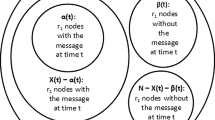Abstract
Because of the dramatic changes in topology and frequently interrupted connections between nodes, messages in delay-tolerant networks are forwarded in the store-carry-forward approach. Routing methods in such an environment tend to increase the number of messages to improve the delivery ratio. However, excessive message copies lead to buffer overflows because of limited storage space. Therefore, an efficient message-scheduling and drop strategy is vital to maximizing network resources, especially when bandwidth is limited and message sizes differ. We developed a theoretical framework called the knapsack-based message scheduling and drop strategy in theory (KMSDT) based on epidemic message dissemination. To improve the delivery ratio, this strategy sorts message copies by utility per unit and, if buffer overflows occur, it decides which messages to drop based on the solution to the knapsack problem. Furthermore, we developed a practical framework called the knapsack-based message scheduling and drop strategy in practice (KMSDP). Rather than collecting global statistics as done in the KMSDT, KMSDP estimates all parameters by using locally collected statistics. Simulations based on synthetic trace are done in ONE. Results show that, without affecting the average delay or overhead ratio, KMSDP and KMSDT achieve a better delivery ratio than other congestion-control strategies.
Access this chapter
Tax calculation will be finalised at checkout
Purchases are for personal use only
Preview
Unable to display preview. Download preview PDF.
Similar content being viewed by others
References
Fall, K.: A delay-tolerant network architecture for challenged internets. In: Proc. of ACM SIGCOMM 2003, pp. 27–34 (2003)
Akyildiz, I., Akan, B., Chen, C.: Computer Networks. InterPlaNetary Internet: State-of-the-art and Research Challenges 43(2), 75–112 (2003)
Krishnan, R., Basu, P., Mikkelson, J.M.: The spindle disruption-tolerant networking system. In: Proc. of MILCOM 2007, pp. 1–7 (2007)
Pentland, A., Fletcher, R., Hasson, A.: Daknet: rethinking connectivity in developing nations. IEEE Computer 37(1), 78–83 (2004)
Juang, P., Oki, H., Wang, Y., Martonosi, M., Peh, L., Rubenstein, D.: Energy-efficient computing for wildlife tracking: design tradeoffs and early experiences with zebranet. In: Proc. of ASPLOS, pp. 96–107 (2002)
Xiao, M., Wu, J., Huang, L.: Community-Aware Opportunistic Routing in Mobile Social Networks. IEEE Transactions on Computers 63(7), 1682–1695 (2014)
Wu, J., Wang, Y.: Hypercube-based Multi-path Social Feature Routing in Human Contact Networks. IEEE Transactions on Computers 63(2), 383–396 (2014)
Zheng, H., Wang, Y., Wu, J.: Optimizing multi-copy two-hop routing in mobile social networks. In: Proc. of IEEE SECON (June 2014)
Wang, Y., Wu, J., Xiao, M.: Hierarchical cooperative caching in mobile opportunistic social networks. In: Proc. of IEEE GLOBECOM 2014 (December 2014)
Krifa, A., Barakat, C.: Message Drop and Scheduling in DTNs: Theory and Practice. IEEE Transactions on Mobile Computing 11(9), 1470–1483 (2012)
Dohyung, K., Hanjin, P., Ikjun, Y.: Minimizing the impact of buffer overflow in dtns. In: Proc. of CFI (2008)
Erramilli, V., Crovella, M.: Forwarding in opportunistic networks with resource constraints, in: Proceedings of the third acm workshop on challenged networks. In: Proc. of ACM CHANTS 2008, pp. 41–48 (2008)
Elwhishi, A., Ho, P., Naik, K., Shihada, B.: A Novel Message Scheduling Framework for Delay Tolerant Networks Routing. IEEE Transactions on Parallel and Distributed Systems 24(5), 871–880 (2013)
Krifa, A., Barakat, C.: Optimal buffer management policies for delay tolerant networks. In: Proc. of IEEE SECON 2008, pp. 260–268 (2008)
Krifa, A., Barakat, C.: An optimal joint scheduling and drop policy for delay tolerant networks. In: Proc. of IEEE WoWMoM 2008, pp. 1–6 (2008)
Yong, L., Meng, J.Q.: Adaptive optimal buffer management policies for realistic dtns. In: Proc. of IEEE GLOBECOM 2009, pp. 1–5 (2009)
Spyropoulos, T., Psounis, K., Raghavendra, C.S.: Performance analysis of mobility-assisted routing. In: Proc. of ACM Mobihoc 2006, pp. 49–60 (2006)
Aruna, B., Brian, L., Arun, V.: DTN routing as a resource allocation problem. In: Proc. of ACM SIGCOMM 2007, pp. 373–384 (2007)
Author information
Authors and Affiliations
Editor information
Editors and Affiliations
Rights and permissions
Copyright information
© 2015 Springer International Publishing Switzerland
About this paper
Cite this paper
Wang, E., Yang, Y., Wu, J. (2015). A Knapsack-Based Message Scheduling and Drop Strategy for Delay-Tolerant Networks. In: Abdelzaher, T., Pereira, N., Tovar, E. (eds) Wireless Sensor Networks. EWSN 2015. Lecture Notes in Computer Science, vol 8965. Springer, Cham. https://doi.org/10.1007/978-3-319-15582-1_8
Download citation
DOI: https://doi.org/10.1007/978-3-319-15582-1_8
Publisher Name: Springer, Cham
Print ISBN: 978-3-319-15581-4
Online ISBN: 978-3-319-15582-1
eBook Packages: Computer ScienceComputer Science (R0)





